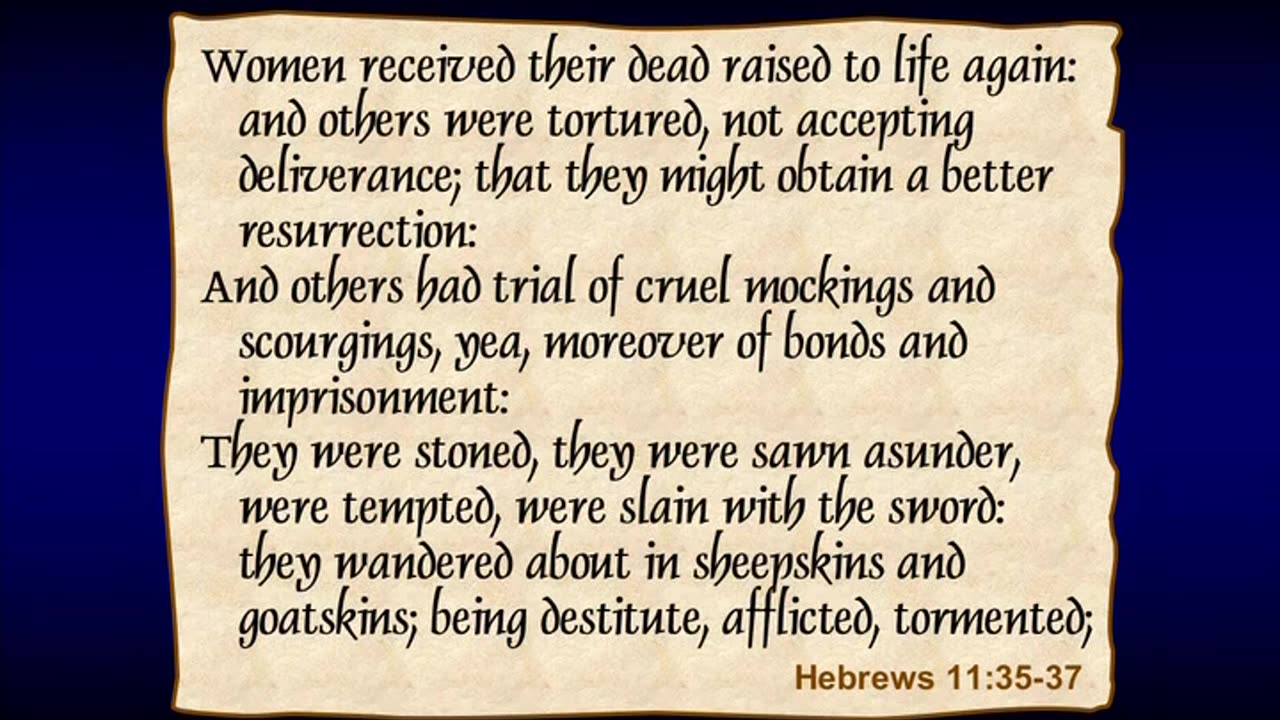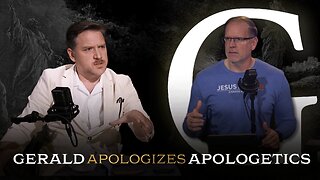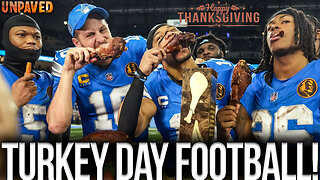Premium Only Content

Romans by Chuck Missler Lesson 11
The Book of Romans Session 11
Romans 8: Part 3—Our Eternal Security
For the law of the Spirit of life in Christ Jesus hath made me free [set me
free] from the law of sin and death.
Romans 8:2
This verse summarizes Romans 7 (Cf. Rom 7:23). While the law of
sin and death will be with us as long as we are in this body, it doesn’t
necessarily have dominion. We have a choice (abiding in Him: organic
union; Jn 15:1-5). “The law of the Spirit of life”: genitive case = “The
law [principle] of the Life-giving Spirit.”
Romans 8:28-39
Verses:
28-30 “Boot Camp” for Heaven?
31-39 Eternal Security; Predestination vs. Free Will?
The Spirit itself beareth witness with our spirit, that we are the children of
God: And if children, then heirs; heirs of God, and joint-heirs with Christ;
if so be that we suffer with him, that we may be also glorified together.
Romans 8:16-17
This is a conditional reward. Many may arrive in heaven sorely disap-
pointed!
Verse 28]
And we know that all things work together for good to them that love God, to
them who are the called according to his purpose.
Verse 29]
For whom he did foreknow, he also did predestinate to be conformed to the
image of his Son, that he might be the firstborn among many brethren.
Verse 30]
Moreover whom he did predestinate, them he also called: and whom he called,
them he also justified: and whom he justified, them he also glorified.
Verse 31]
What shall we then say to these things? If God be for us, who can be against us?
Verse 32]
He that [even] spared not his own Son, but delivered him up for us all, how
shall he not with him also freely give us all things?
Verse 33]
Who shall lay any thing to the charge of God’s elect? It is God that justifieth.
Verse 34]
Who is he that condemneth? It is Christ that died, yea rather, that is risen again,
who is even at the right hand of God, who also maketh intercession for us.
Verse 35]
Who shall separate us from the love of Christ? shall tribulation, or distress, or
persecution, or famine, or nakedness, or peril, or sword?
Verse 36]
As it is written, For thy sake we are killed all the day long; we are accounted
as sheep for the slaughter.
Verse 37]
Nay, in all these things we are more than conquerors through him that loved us.
Verse 38]
For I am persuaded, that neither death, nor life, nor angels, nor principalities,
nor powers, nor things present, nor things to come,
Verse 39]
nor height, nor depth, nor any other creature [created thing], Shall be able to
separate us from the love of God, which is in Christ Jesus our Lord.
* * *
"Verse 28]
And we know that all things work together for good to them that love God, to
them who are the called according to his purpose."
Sanctification, from its beginning in regeneration to its completion
in glorification, is ultimately God’s work, appropriated by faith (Phil
1:6).
“...all things work together...”: “He works together” sunerge,w synergeo,
active voice present tense of the verb synergei. This emphasizes that
this is a continuing activity of God. It takes continual external inputs
to coordinate the process. (As every cell division in the human zygote:
having the complete coding in each cell—DNA —is not enough: what
is needed is conflict resolution logic to form specific tissue, organs,
etc.)
“...called”: klhto,j kletos means to be summoned to, divinely selected
and appointed (Rom 1:6; 8:30). Example: The saga of Joseph (Gen
50:20).
Eternal Security
Can a man lose his salvation? Yes! If it depends on him:
• The Arminian denies that the true child of God is eternally secure.
• The Calvinist insists that, if he does not persevere in holiness, he
was never regenerate in the first place. After 400 years of doctrinal
disputes, with outstanding scholars on both sides of this issue, appear to
be the result of a failure to adequately distinguish between justification
and the possibility of several different inheritances.
The Partaker, metachoi, as a true child of God, is “obligated” to per-
severe (Paul’s word, Rom 8:12). But he might not. If he does not, he
does not forfeit salvation, but faces divine discipline in time, and the
loss of reward at the judgment seat of Christ.
All three persons of the Godhead have a share in preserving to fruition
that which God has determined. We will attempt to interweave their
individual commitment with this review of Romans 8.
The Basis of our Eternal Security
1) Upon His Sovereign Purpose
Eternal purpose declared: Eph 1:11-12. This eternal purpose is anchored
within the veil, confirmed by an oath: Heb 6:17-20.
2) Upon His Solemn Promise
Our salvation depends upon His promise, and not our faithfulness: Rom
4:16: Therefore it is of faith [nothing on man’s part], that it might be
by grace [everything on God’s part]; to the end the promise might be
sure...
If it depended at any point upon human ability to continue to believe,
then the promise could not be secure. The promise that those who be-
lieve will be saved is confirmed everywhere: Gen 15:6; Jn 3:16; Acts
16:33; Rom 4:23-24, et al.)
3) Upon His Infinite Power
He is free to save us. Christ’s death has rendered God free to save us
in spite of moral imperfection. Our eternal security does not depend
upon our moral worthiness. Christ is the propitiation for our sins (1
Jn 2:2).
(To assume that there is some sin which is sufficiently serious to cause
us to forfeit our salvation is to assume that we were less worthy of salvation after having committed this sin than before, and it reduces
salvation down to human ability to merit it.)
He has purposed to keep us saved:
"All that the Father giveth me shall come to me; and him that cometh
to me I will in no wise cast out. For I came down from heaven, not
to do mine own will, but the will of him that sent me. And this is the
Father’s will which hath sent me, that of all which he hath given me
I should lose nothing, but should raise it up again at the last day. And
this is the will of him that sent me, that every one which seeth the Son,
and believeth on him, may have everlasting life: and I will raise him up
at the last day."
John 6:37-40
And I give unto them eternal life; and they shall never perish, nei-
ther shall any man pluck them out of my hand. My Father, which
gave them me, is greater than all; and no man is able to pluck them
out of my Father’s hand.
John 10:28, 29
“Shall never” is a double negative in the Greek, a form which is espe-
cially emphatic.
Note: There are two hands involved! I have searched the original texts; I
cannot find “Whoops!” (no one has ever called God “Butterfingers”).
Some suggest that we, ourselves, can yet snatch ourselves out of the
Father’s hand. What kind of security is it that offers no security against
our own weaknesses? (Jn 5:24).
4) Upon His “Much More” Love
His intent is love based: Cf. Rom 5:6-10. God knew when He saved us
that we were totally depraved, and therefore any new manifestation of
sin in our lives after our conversion cannot be any motivation to God to
change His mind and withdraw His grace and His salvation. Cf. Rom
11:29; Rom 8:32, 38-39.
He saved us for reasons independent of us and outside of us. He was
motivated by His electing love, and not by observation of good in the
sinner. We will explore that in our next session we review, Romans
9:10-13.
5) Upon His Answer to the Prayer of His Son
We, as believers, are called many things in Scripture: saints, believers,
elect, sheep, partakers, etc. But the title most dear to the heart of Christ
is repeated seven times in His high priestly prayer (Jn 17): “those whom
thou hast given me.” (Cf. Jn 17:11-12). Jesus prays that we will be kept
from hell (17:15); and will be with Him in heaven (17:20, 24). [This
keeping is from perishing, not necessarily all forms of inheritance.]
I believe that the Father always answers the prayers of the Son (Jn
11:42).
A Chain of Five Links: Romans 8:29-30
God’s sovereign purpose is exemplified in these two verses:
Verse 29]
For whom he did foreknow, he also did predestinate to be conformed to the
image of his Son, that he might be the firstborn among many brethren.
Verse 30]
Moreover whom he did predestinate, them he also called: and whom he called,
them he also justified: and whom he justified, them he also glorified.
This eternal choice and foreknowledge involves more than establishing
a relationship between God and believers—it involves the certainty
of our sanctification! Those God foreknew He also predestined to be
conformed to the likeness of His Son (Rom 8:29).
1) Foreknow: prior choice, as well as advance knowledge (Amos 3:2):
a personal, loving, and intimate prior choice. The process starts with
foreknowledge. The entire group is brought into God’s eternal plan by
divine foreknowledge and choice is predestined, “predetermined.”
2) Predestinate: simply planned in advance. Eph 1:4-6 adds insight...
3) Called: referred to here is the efficacious call to come to Him. Jesus
said, “My sheep hear my voice and they follow Me” (Jn 10:27-30).
This is an effectual calling: all that are justified will be glorified (Rom
8:23).
4) Justified: declared righteous (Rom 5:1; Cf. Rom 3:24, 28; 4:2; 5:1, 9).
5) Glorified: “Glorified” is another way of saying that God’s children
will be “conformed” to His Son; and that is God’s ultimate “purpose.”
No longer will they “fall short of the glory of God” (Rom 3:23). In the
process not a single person is lost.
These are five unbreakable links: “Those...he also”: This is a clear
statement of the eternal security of the saints.
The resurrected and glorified Lord Jesus Christ will become the Head of
a new race of humanity, purified from all contact with sin and prepared
to live eternally in His presence: cf. 1 Cor 15:42-49 (which precedes
the rapture passage!).
Between the start and finish of God’s plan are indispensable steps:
1) being called (cf. Rom 1:6; 8:28),
2) being justified (cf. Rom 3:24, 28; 4:2; 5:1, 9), and
3) being glorified (cf. Rom 8:17; Col 1:27; 3:4).
...and in the process not a single person is lost. God completes His plan
without any slippage or shrinkage of inventory! Precisely the same
number of men are called, justified, and glorified.
The Basis of our Eternal Security
It depends Upon God the Father
It is astounding to realize that God’s plan of salvation for people is a
program that reaches from eternity past to eternity future which God
will carry out perfectly.
Recognizing this, we now encounter...
Seven Questions
Seven questions which specifically raise the question of the believer’s
eternal security in this magnificent conclusion to Romans 8:
1, 2)
Can opposition defeat the Christian? Rom 8:31
Verse 31]
What shall we then say to these things? If God be for us, who can be against us?
“
If”: First class conditional = “since.”
Obviously, Satan and his demonic hosts are against believers (cf. Eph
6:11-13; 1 Pet 5:8), but they cannot ultimately prevail and triumph over
believers. God is the self-existent One and the sovereign Creator and,
since He is for believers, no one can oppose believers successfully.
3) Will we have the resources? Rom 8:32
Verse 32]He that [even] spared not his own Son, but delivered him up for us all, how shall he not with him also freely give us all things?
(The KJV and RV failed to translate the little Greek particle ge, ge,
“even,” which gives this passage a peculiar emphasis.)
The word “spare” (evfei,sato, epheisato, from fei,domai, pheidomai) is the
same word used in the Septuagint in Genesis 22:12, translated “with-
held.” God said to Abraham, “You have not withheld your son.” Then
God directed Abraham to spare Isaac and to offer a ram as a substitute
(Gen 22:2-14), whereas God offered His own Son, on that very spot,
as the Sacrifice for sin (Jn 1:29).
Since God gave the greatest Sacrifice of all, His own Son, He will
certainly not hesitate to give believers all other things pertaining to and
leading to their ultimate sanctification (cf. 2 Peter 1:3). Answered: Rom
5:6-10. The next two questions are forensic (legal) in nature:
4) Will our failures reverse our justification?
Rom 8:33
Verse 33]
Who shall lay any thing to the charge of God’s elect? It is God that justifieth.
“Charge”: evgkale,se, enkalesei, “make a formal accusation in court;
press charges” (cf. Acts 19:40; 23:29; 26:2).
Satan is identified as “the accuser” of God’s people (Rev 12:10; cf. Zech
3:1). His accusations are valid, because they are based on the believer’s
sinfulness and defilement. But Satan’s accusations will be thrown out
of court, because it is God who justifies. The Judge Himself declares
the accused person righteous on the basis of his faith in Jesus Christ
(Rom 3:24; 5:1). As a result all accusations are dismissed and no one
can bring an accusation that will stand (cf. Rom 8:1!).
5) Can anyone condemn us for any reason?
Rom 8:34
Verse 34}
Who is he that condemneth? It is Christ that died, yea rather, that is risen again, who is even at the right hand of God, who also maketh intercession for us.
Jesus is God’s appointed Judge (Jn 5:22, 27; Acts 17:31), so Paul answered
this question by stating, Christ Jesus. But Jesus is the very One whom
the believer has trusted for salvation. Furthermore, He is the One who
died—more than that (lit., “but more”), who was raised to life—who is
at the right hand of God (cf. Lk 22:69; Acts 2:33; 5:31; Eph 1:20; Col
3:1; Heb 1:3, 13; 8:1; 10:12; 12:2; 1 Pet 3:22) and is also interceding
for us. The Lord Jesus Christ is indeed the Judge, but He is also the
One with whom each believer is identified by faith.
As a result He is a believer’s Sacrifice for sin (cf. Rom 5:8; 8:32), his
new life (a believer shares in Christ’s resurrection life; 6:4, 8, 11; Eph
2:5-6; Col 2:13), his Intercessor (cf. Heb 7:25; also the Holy Spirit
intercedes, Rom 8:26-27) and his Defense (1 Jn 2:1).
Certainly the Judge will not condemn His own who are in Him by faith!
(Again, cf. Rom 8:1.)
It Depends Upon God the Son
Thus, if God has already justified the man who believes in Jesus (Rom
8:26, 30), how can He lay anything to the charge of His justified one?
His justification comes from the imputed righteousness of Christ and
is legally ours! It is not a subject of merit, and its loss cannot be the
subject of demerit. Like a father, God can and does correct His earthly
sons, but they always remain sons. (Cf. the Prodigal Son, Lk 15:24.)
God, having justified the ungodly (Rom 4:5), will not and cannot contra-
dict Himself by charging them with evil. “Who is he that condemneth?”
(Rom 8:34) Paul gives four answers, each of which are taught elsewhere
in Scripture, but are gathered here to underscore the unconditional
security of the believer:
1) Christ died;
2) He is risen;
3) He advocates; and
4) He intercedes.
1) Upon His Substitutionary Death Rom 5:8, 8:34
Who can condemn us if the penalty has already been paid? The greatest
proof of eternal security is justification by faith. (Justification refers to how God sees us, not how others—or even we ourselves—see us.) It
is entirely a forensic (legal) matter: Col 2:14: our “Certificate of Debt”
has been “paid in full”: tetelstai! (Jn 19:30).
[Example: 5 sins/day x 365 days/year x 70 years = 127, 750 sins...
each!] Each paid for individually, for each of us as individuals. No
discount for volume; no “package deal.” See The Agony of Love brief-
ing package.] This redemption was eternal (Heb 9:12); once and for
all (Heb 10:12, 14).
2) Upon His Substitutionary Life
Rom 5:9-10, 19; 10:4; Col 2:10, et al.
3) Upon His Present Session: Advocate and Intercessor
Legal Advocate (1 Jn 2:1-2). [The Arminians fear that this doctrine
will tend toward sin; John says here that it is a motivation not to sin.]
And priestly Intercessor (Heb 7:23-25; 9:24). “Saves to the uttermost”
sounds pretty good to me.
It Depends Upon God the Holy Spirit
1)Upon His Ministry of Regeneration (Titus 3:5; 2 Cor 5:17; Eph 2:10).
2)Upon His Baptizing Ministry (Rom 6:3, 8-11; 1 Cor 12:13).
3)Upon His Sealing Ministry (2 Cor 1:22; Eph 1:13-14; Eph 4:30).
Pledge: Greek:avrrabw,n arrabon: a legal concept: a first installment, with
which a man secures a legal claim upon a thing as yet unconsummated;
a down payment; deposit; pledge; an evidence of good faith; obligating
the party to consummate the commitment involved. (A pledge as in Gen
38:17ff). In Rom 8:23, the Holy Spirit is designated as a down payment,
a “first fruits,” to be followed by more. We are sealed unto that day.
Sealing Ministry: If one person who was born again in Christ ever
fails to enter into heaven when he dies, then God has broken His pledge.
No conditions are mentioned. It is a work of God and depends upon
Him alone.
Sealing: Greek: sfragi,zw sphragizo: to set a seal was a mark of protection (Cf.
Mt 27:66, on the tomb of Christ) and ownership. It was also the term for a boundary marker. When the Holy Spirit seals, it is with the signet
ring of the Father on hearts of wax. He leaves the mark of ownership.
A broken seal is an indication that the protection wasn’t adequate. Can
you break the seal? Can Satan?
That still leaves some issues of grave importance: what different kinds
of inheritance are there? To “enter” is not equivalent to “ownership.”
(We will be exploring this in Chapter 9 and following...)
Seven Questions
1,2) Can opposition defeat the Christian? (Romans 8:31)
3) Will we have the resources? (Romans 8:32)
4) Will our failures reverse our justification? (Romans 8:33)
5) Can anyone condemn us for any reason? (Romans 8:34)
6,7) What kind of assurance can we have of
victory? Rom 8:35
Verse 35]
Who shall separate us from the love of Christ? shall tribulation, or distress, or
persecution, or famine, or nakedness, or peril, or sword?
The apostle suggested seven things a believer might experience (Paul
experienced all of them; 2 Cor 11:23-28) that some might think could
come between a believer and Christ’s love:
•Tribulation (qli/yij thilpsis) “pressure or distress”; mentioned frequently
by Paul in 2 Corinthians;
•Distress (stenocwri,a stenochoria), lit., “narrowness,” i.e., being pressed
in, hemmed in, crowded;
•Persecution (diwgmo,j diogmos) 10X in NT, always in reference to the
gospel.
•Famine (limo,j limos ) 12X in NT; The God of Elijah looks after His
own.
•Nakedness (gumno,thj gumnotes); 1 Cor 4:11.
•Peril [jeopardy, danger] (ki,ndunoj kindunos) 8X in one verse, 2 Cor
11:26. Cf. 1 Cor 15:30.
•Sword. The world hates the saints.
These things—stated in increasing intensity—do not separate Christians
from Christ; instead they are part of the “all things” (Rom 8:28) God
uses to bring them to conformity to His Son.
Verse 36]
As it is written, For thy sake we are killed all the day long; we are accounted
as sheep for the slaughter.
Paul then quotes Psalm 44:22 to remind his readers that in this life
the people of God must face much affliction (cf. Jn 16:33), including
even martyrdom for some. In the early days of the church one or more
Christians were martyred every day, or faced the possibility of it. Their
persecutors valued Christians’ lives as nothing more than animals to
be butchered.
Verse 37]
Nay, in all these things we are more than conquerors through him that loved us.
In all these adversities (cf. “all things” in Rom 8:28 and “all things” in
v. 32 with all these things in v. 37), rather than being separated from
Christ’s love, believers are more than conquerors (present tense, “keep
on being conquerors to a greater degree” or “keep on winning a glori-
ous victory”) through Him who loved us. Jesus Christ and His love for
believers enable them to triumph (cf. 2 Cor 2:14).
His Final Guarantee
Verse 38]
For I am persuaded, that neither death, nor life, nor angels, nor principalities,
nor powers, nor things present, nor things to come,
Wow—Angels! Principalities [demons]! Powers [of “darkness”!]. What
else is there? What else, in the entire universe, matters? This should
really re-prioritize our entire outlook on everything!
"Beloved, now are we the sons of God, and it doth not yet appear what we
shall be: but we know that, when he shall appear, we shall be like him;
for we shall see him as he is."
1 John 3:2
There is some very provocative physics implied in this: when He shall
appear we shall be like Him; for we shall see Him as He is. Not a 3-
dimensional representation of an “n-dimensional” being—but as He
really is since we will be like Him! Wow!!
* * *
Our Coming King
—inspired by Pastor S.D. Lockridge
He is:
King of the Jews (racial);
King of Israel (national);
King of all the Ages;
King of Heaven;
King of Glory;
King of Kings;
..and Lord of Lords. [Do you know Him? Do you really?]
A prophet before Moses;
A priest after Melchizedek;
A champion like Joshua;
An offering in place of Isaac;
A king from the line of David;
A wise counselor above Solomon;
A beloved/rejected/exalted son like Joseph.
And yet far more...
The Heavens declare His glory...
and the firmament shows His handiwork..
He who is, who was, and who always will be;
The first and the last
He is the Alpha and the Omega
the Aleph and the Tau
the A and the Z;
He is the first fruits of them that slept.
He is the “I AM that I AM” [the Voice of the Burning Bush!]
He is the Captain of the Lord’s Host
He was the conqueror of Jericho
He is enduringly strong;
He is immortally graceful;
He is imperially powerful;
He is impartially merciful;
In Him dwells the fullness of the Godhead bodily;
The very God of very God.
He is our Kinsman-Redeemer
and He is our Avenger of Blood;
He is our City of Refuge;
our Performing High Priest,
our Personal Prophet,
our Reigning King.
He’s the Loftiest idea in Literature;
He’s the highest Personality in Philosophy;
He’s the Fundamental Doctrine of Theology;
He’s the Supreme Problem in “higher criticism”!
He’s the Miracle of the Ages
the Superlative of everything good
We are the beneficiaries of a Love Letter:
It was written in blood,on a wooden cross erected in Judea 2,000 years ago.
He was crucified on a cross of wood,
yet He made the hill on which it stood.
By Him were all things made that were made;
without Him was not anything made that was made;
By Him are all things held together!
What held Him to that cross? It wasn’t the nails!
(At any time He could have declared, “I’m out of here!”)
It was His love for you and me.
He was born of a woman
so that we could be born of God;
He humbled Himself
so that we could be lifted up;
He became a servant
so that we could be made co-heirs;
He suffered rejection
so that we could become His friends;
He denied Himself
so that we could freely receive all things;
He gave Himself
so that He could bless us in every way.
He is
Available to the tempted and the tried;
Blesses the young;
Cleanses the lepers;
Defends the feeble;
Delivers the captives;
Discharges the debtors;
Forgives the sinners;
Franchises the meek;
Guards the besieged;
Heals the sick;
Provides strength to the weak;
Regards the aged;
Rewards the diligent;
Serves the unfortunate;
Sympathizes and He saves!
His Offices are manifold;
His Reign is righteous;
His Promises are sure;
His Goodness is limitless;
His Light is matchless;
His Grace is sufficient;
His Love never changes;
His Mercy is everlasting;
His Word is enough;
His Yoke is easy and
His Burden is light!
He’s indescribable;
He's incomprehensible;
He's irresistible;
He's invincible!
The Heaven of heavens cannot contain Him;
Man cannot explain Him
The Pharisees couldn’t stand Him
and learned that they couldn’t stop Him;
Pilate couldn’t find any fault with Him;
the witnesses couldn’t agree against Him.
Herod couldn’t kill Him
death couldn’t handle Him
the grave couldn’t hold Him!
He has always been and always will be;
He had no predecessor and
will have no successor;
Your can’t impeach Him and
he isn’t going to resign!
His name is above every name;
That at the name of Yeshua
Every knee shall bow
Every tongue shall confess
That Jesus Christ is Lord!
His is the kingdom, the power, and the glory... for ever, and ever.
...Amen!
Coming Up!
The next three chapters focus on Israel: Chapter 9 - Israel Past; Chapter
10 - Israel Present; and Chapter 11 - Israel Future. Does God keep His
promises? Who are the metachoi? What different kinds of inheritance
are there?
A side note on the last thing Chuck mentions - Romans 8: 37-39.
Verse 37]
Nay, in all these things we are more than conquerors through him that loved us.
Verse 38]
For I am persuaded, that neither death, nor life, nor angels, nor principalities,
nor powers, nor things present, nor things to come,
Verse 39]
nor height, nor depth, nor any other creature [created thing], Shall be able to
separate us from the love of God, which is in Christ Jesus our Lord.
A very legitimate argument can be made that The Book of Romans has nothing BUT serious implication money statements about salvation. But I would say when you look at verses 37 through 39 that is like the creme de la creme of legal, total, contractual BINDING to The Lord. I think THAT is the most important statement. Now if you buy into that argument then I would also have you consider the Chapter number and verse and what we are talking about contextually. Romans EIGHT is specifically talking about salvation through Yeshua, and 8 is the number of Christ. 37 is a HUGE number God uses to "denote Himself", "put His mark on things." A prime number consisting of the number 3 (The Holy Spirit) and 7 (The Seven-Fold Spirit of Christ), divinity, divine plan, completion.
Also it is the last thing said to end the chapter. It is the finality of Paul's argument on salvation and justification.
Just a thought for your consideration. Just my opinion.
The Lord bless you.
Some resources I like:
Prophecy Simplified
https://rumble.com/c/c-6844258
https://rumble.com/user/DutchUncleJohn
Sermons, My Dutch Uncle John's video's, audio bibles, windows privacy help and more!
https://rumble.com/user/Bitcoin01
Audio bible books and many biblical movies
https://rumble.com/user/drcervantes
Walter Veith - Total Onslaught
My original Greek friends
https://rumble.com/c/c-5247424?e9s=src_v1_cbl
here is the complete series:
https://rumble.com/c/c-7750566
Also Amazing Discoveries website with a TV channel (haven't watched it yet), and Walter Veith, his videos, and seminars-
https://amazingdiscoveries.org/
Chuck Missler lessons and talks:
https://rumble.com/c/c-3633088
-
 LIVE
LIVE
Dr Disrespect
7 hours ago🔴LIVE - DR DISRESPECT - ARC RAIDERS - RANDOM SQUADS
1,758 watching -
 1:54:06
1:54:06
Russell Brand
3 hours agoHas he done it? Ukraine Accepts Core Peace Terms — Nobel Prize incoming? - SF655
100K13 -
 24:37
24:37
Stephen Gardner
3 hours agoTrump JUST Exposed 2 HUGE LIES meant to TAKE HIM DOWN!!
13.5K14 -
 1:09:52
1:09:52
vivafrei
3 hours agoCBS News "Debunks" The Blaze Pipe Bomber Story? Thomas Massie Threatened by Kash Patel? AND MORE!
24.8K14 -
 1:21:16
1:21:16
The White House
6 hours agoVice President JD Vance Celebrates Thanksgiving with Servicemembers and Delivers Remarks
21.7K13 -
 59:49
59:49
The Quartering
4 hours agoMTG MELTDOWN On X, Hasan Piker Runs From Ben Shapiro & AI Nightmare!
98.9K40 -
 1:16:24
1:16:24
DeVory Darkins
5 hours agoDISTURBING: Eric Swalwell left DUMBFOUNDED after he gets confronted about trans athletes
84.1K44 -
 2:06:36
2:06:36
Side Scrollers Podcast
6 hours agoThis is the Dumbest Story We’ve Ever Covered… | Side Scrollers
43.6K8 -
 1:13:26
1:13:26
Steven Crowder
8 hours ago🔴 Jay Dyer on Hollywood, The Occult, and the Attack on the American Soul
266K198 -
 1:26:28
1:26:28
Sean Unpaved
6 hours agoNFL Thanksgiving Games Are Going To Be ELECTRIC! | UNPAVED
35.3K3